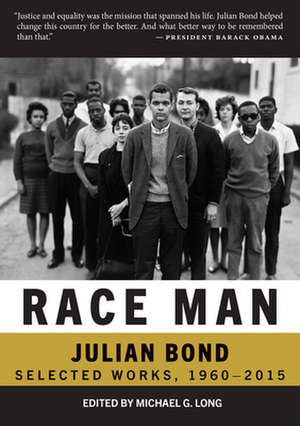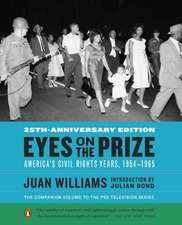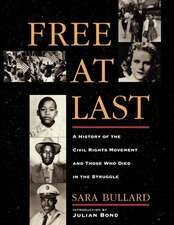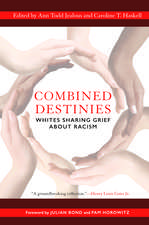Race Man: The Collected Works of Julian Bond, 1960-2015
Autor Julian Bonden Paperback – 26 feb 2020
Newsweek, Lit Hub, The Philadelphia Inquirer, and The Atlanta Journal Constitution pick Race Man by Julian Bond as one of their Most-Anticipated Books of 2020
This compilation of works by social activist and civil rights leader Julian Bond should be required reading in 2020.--Juliana Rose Pignataro, Newsweek
Bond's essays, speeches and interviews were powerful weapons in his lifelong fight for civil rights.--The New York Times
Justice and equality was the mission that spanned his life. Julian Bond helped change this country for the better. And what better way to be remembered than that.--President Barack Obama
An inspiring, historic collection of writings from one of America's most important civil rights leaders.
No one in the United States did more to advance the legacy of Martin Luther King Jr. than Julian Bond. Race Man--a collection of his speeches, articles, interviews, and letters--constitutes an unrivaled history of the life and times of one of America's most trusted freedom fighters, offering unfiltered access to his prophetic voice on a wide variety of social issues, including police brutality, abortion, and same-sex marriage.
A man who broke race barriers and set precedents throughout his life in politics; co-founder of the Southern Poverty Law Center and long-time chair of the NAACP; Julian Bond was a leader and a visionary who built bridges between the black civil rights movement and other freedom movements--especially for LGBTQ and women's rights. As we enter the third decade of the twenty-first century, there is no better time to return to Bond's works and words, many of them published here for the first time.
Endlessly grateful for this collection of work that shows the expansive nature of Julian Bond's ideas of black liberation, and how those ideas are woven into the fabric of both resistance and uplift. Race Man is the map of a journey that was not only struggle and not only triumph.--Hanif Abdurraqib, author of They Can't Kill Us Until They Kill Us: Essays
Race Man is the essential collection of Julian Bond's wisdom--and required reading for the organizers and leaders who follow in his footsteps today.--Marian Wright Edelman, President Emerita, Children's Defense Fund
Race Man is a staggering collection that offers a genealogy of Bond's freedom-oriented politics and soul work as captured in his written words. Race Man is a book that looks back and speaks forward. It is a timely example of what movement building can look like when servant leaders refuse to leave the most vulnerable out of their visions for Black freedom. We need that reminder, like never before, today.--Darnell L. Moore, author of No Ashes in the Fire: Coming of Age Black & Free in America
An] essential volume that will appeal to a broad audience of readers interested in the civil rights movement and human rights overall . . .--Library Journal, Starred Review
Bond's years as an activist also offer a guide through the intellectual and political history of the left in the second half of the 20th century . . . Bond's essays capture the intellectual world that inspired him and that he helped inspire in turn.--Robert Greene II, The Nation
Preț: 129.50 lei
Nou
24.78€ • 25.78$ • 20.46£
Carte disponibilă
Livrare economică 24 martie-07 aprilie
Specificații
ISBN-10: 0872867943
Pagini: 488
Dimensiuni: 152 x 229 x 25 mm
Greutate: 0.45 kg
Editura: City Lights Publishers
Notă biografică
Horace Julian Bond was a leader in the Civil Rights Movement, politician, professor and writer. In 1960, while attending Morehouse College in Atlanta, Bond was a founding member of the Student Nonviolent Coordinating Committee, leading student protests against segregation. A founder of the Southern Poverty Law Center, he served as its president in the 1970s while sitting in the Georgia House of Representatives. In 1968, Bond led a challenge delegation from Georgia to the Democratic National Congress, where he became the first African American and the youngest person to ever be nominated for Vice President of the United States, though he was ineligible due to his young age. In 1975, after ten years in the Georgia House, he served six terms in the Georgia senate, after which he taught at numerous colleges including Drexel and Harvard. In 1998, Bond was elected Board Chairman of the NAACP and, after his term, remained active as Chairman Emeritus for eleven years. He is the author of A Time To Speak, A Time To Act, a collection of his essays, as well as Black Candidates: Southern Campaign Experiences. His writing has appeared in many magazines and newspapers. He remained President Emeritus of the Southern Poverty Law Center until his death in 2015.
Michael G. Long is the author or editor of numerous books on civil rights, religion, and politics, including We the Resistance: Documenting A History of Nonviolent Protest in the United States; Race Man: Selected Works of Julian Bond; I Must Resist: Bayard Rustin's Life in Letters; Marshalling Justice: The Early Civil Rights Letters of Thurgood Marshall; and First Class Citizenship: The Civil Rights Letters of Jackie Robinson. Long has written for the Los Angeles Times, the Chicago Tribune, ESPN's The Undefeated, and USA Today, and his work has been featured or reviewed in the New York Times, the Washington Post, Mother Jones, and many others. Long has spoken at Fenway Park, the Central Intelligence Agency, the Smithsonian, the Library of Congress, and the National Archives, and he has appeared on MSNBC, PBS, C-SPAN, and National Public Radio.
Cuprins
Prefaces
The Love Endures by Pamela Horowitz
Practicing Dissent by Jeanne Theoharis
Editor's Introduction
CHAPTER ONE
The Atlanta Student Movement and SNCC
The Fuel of My Civil Rights Fire
The Conversation That Started It All
A Student Voice
Let Freedom Ring
Lonnie King Is Acid Victim
The Murder of Louis Allen
SNCC and JFK
Freedom Summer: What We Are Seeking
How to Remember the Atlanta Student Movement
SNCC: Alienated, Paranoid, and Near Collapse
SNCC's Legacy
CHAPTER TWO
Vietnam and the Politics of Dissent
The Right to Dissent
I Consider Myself a Pacifist
Martin Luther King, Jr. and Vietnam
Elijah Muhammad and the 1968 Democratic National Convention
Eugene McCarthy and a New Politics
The Warfare State
Fighting Nixon
Rethinking Violence in America
Angela Davis Is a Political Prisoner
The Failure of Kent State
Lessons from Vietnam
CHAPTER THREE
Two Black Colonies
The Population Bomb as Justification for Genocide
Escaping from Colonialism
The United States Is a Colonial Society
Liberation in Angola and Alabama
South Africa: The Cancer on the African Continent
CHAPTER FOUR
Nixon and the Death of Youthful Protest
Nixon's Black Supporters Should Shuffle Off
Uncle Strom's Cabin: The Reelection of Richard Nixon
The New Civil Rights Movement
Nixon's Racist Justification of Watergate
George Wallace Still Champion of the Politics of Race
Blacks and Jews
Why No Riots?
The Death of Youthful Protest
Politics Matters
CHAPTER FIVE
Uncle Jimmy's Cabin
Carter Hides His Red Neck
Election 76-A Political Diary
Why I Can't Support Jimmy Carter
SNCC Reunites, Carter Is Absent
Blacks Are Politically Impotent
Griffin Bell and the Right to Dissent
Blacks and Moral Suicide
Carter Ignores Blacks
Political Prisoners in the United States
Carter's Misguided Fight Against Inflation
CHAPTER SIX
Civil Rights Milestones
Fannie Lou Hamer: Lady in a Homespun Dress
The Civil Rights Movement: The Beginning and the End
The Racial Tide Has Turned Against Us
King: Again a Victim
The 25th Anniversary of Brown: Time to Do for Ourselves
- E. B. Du Bois and John F. Kennedy-Which Is Greater?
Roy Wilkins: A Reasonable Man
CHAPTER SEVEN
Our Long National Nightmare:
Reagan, Bush, and the Assault on Women
Reagan and South Africa
A New Social Darwinism: The Survival of the Richest
Reagan's Justice
My Father and the Death Penalty
Nicaragua and Paranoia
The Break that Never Healed: John Lewis's Painful Criticism
Operation Rescue Is No Civil Rights Movement
A Kinder, Gentler Nation?
My Case Against Clarence Thomas
The Need for More Civil Rights Laws
In Defense of the NAACP
Dear Michael: Advice for Running for Office
CHAPTER EIGHT
The Measure of Men and Racism:
Jefferson and King, Clinton and Dole, Farrakhan and Simpson
The Most Useful Founding Father
Remembering All of Dr. King
Bill Clinton and Hope for America
Failures: Gingrich and Dole
Clinton Against Dole
Gangsta Rap
Louis Farrakhan Is a Black David Duke
The Unsurprising Acquittal of O. J. Simpson
King Supported Affirmative Action
King and the Death Penalty
CHAPTER NINE
The George W. Bush Years:
The War on Terror and the Fight for
Poor Blacks, Women, and LGBT Rights
Racial Injustice in the Criminal Justice System
Social Security and African Americans
September 11 and Beyond
Slavery and Terrorism
Our Leaders Are Wrong About the War
The NAACP and the Right to Reproductive Freedom
Are Gay Rights Civil Rights?
AIDS Is a Major Civil Rights Issue
Why I Will March for LGBT Rights
In Katrina's Wake
We Must Persevere
CHAPTER TEN
Barack Obama and Ongoing Bigotry
Civil Rights: Now and Then
What Barack Obama Means
Homophobia and Black America
Same-Sex Marriage: More than a White Issue
Religion-Based Exemptions Discriminate Against LGBT People
The Civil War and the Confederate Flag
Voting Rights: Which Side Are You On?
Voting Rights Again: The Most Pressing Domestic Issue Today
We All Must Protest
Our Journey Is Nowhere Near Over
Afterword by Douglas Brinkley
Acknowledgments





